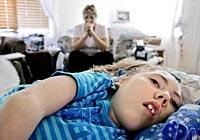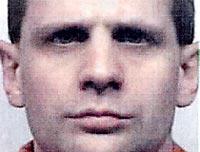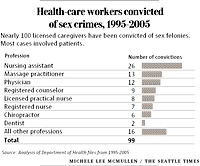|
|
|
|
|
|
Friday, April 28, 2006 - Page updated at 10:43 AM The weakest pay the price for anemic state oversightSeattle Times staff reporters The nursing-home resident was only 50, but Huntington's disease had robbed her of much of her memory. Still, Luella Longmore was sure of what had happened. She'd been raped on the bathroom floor. It was Jose, the young nursing assistant, she insisted. Jose S. Hernandez, 32, denied touching her. But Seattle's First Hill Care Center reported him to police and the Washington Department of Health. Seattle police started an investigation by taking Longmore to the hospital for a rape exam. The Health Department didn't get that far. The agency decided the complaint didn't warrant an investigation and dismissed it. Had the Health Department contacted the police, it would have learned the rape exam had turned up semen. Instead, Hernandez was free to care for patients for six months, until DNA tests matched the semen to him. He was charged with second-degree rape, pleaded guilty to a lesser charge, and went to prison. Only then did the department revoke his license. "The complaint didn't look like it was likely to lead to substantiation" because the woman had dementia and there wasn't an eyewitness, Health Department lawyer Trent Kelly explained. But the agency's dismissal of the rape complaint was not an aberration. The Health Department has dismissed — without any investigation — 461 sexual-misconduct complaints against health-care professionals in the past decade, or nearly one-third of the 1,494 complaints received. These complaints include counselors accused of molesting clients, nurses suspected of fondling patients and doctors turned in for demanding sex in exchange for treatment. A SEATTLE TIMES SPECIAL REPORT MISCONDUCT DATABASE Search a detailed database of health-care professionals charged with misconduct. THE STATE'S PROBLEM (Sun, 4/23)
LARGEST NUMBER OF OFFENDERS (Mon, 4/24) PREDATORS IN THE SYSTEM
GRAPHICS
RESOURCES As a result, health-care licenses were left unblemished, and possible victims were cast aside. And sexual predators went undetected, only to harm again. "Obviously, that a patient was raped by a nursing assistant is awful and everything we are trying to protect patients from," said Laurie Jinkins, assistant secretary of the Health Department. Longmore's daughter, Shelly Hamilton, who lives in Rosamond, Calif., doesn't believe the Health Department protected her mother at all: "My mother cried for help and she was ignored." Secretary of Health Mary Selecky, in response to The Times' findings, said that from now on her agency will investigate each sexual-misconduct complaint. "If there was a question about this in the past, it should be cleared up," Selecky said. "All sexual-misconduct complaints should be investigated." Predator unchecked The state drops cases — and drops the ball. Even when the Health Department opts to investigate allegations of sexual abuse, that doesn't mean perpetrators will be disciplined. The majority of the agency's sexual-misconduct investigations result in no form of disciplinary action. The Times found that of the 1,033 such complaints investigated over the past decade, 56 percent were closed without charges being filed. At least 48 of the providers whose cases were dropped later were disciplined for new sexual misconduct. In many of the dismissed cases, there was no evidence of a violation. But in other cases, such as that of licensed practical nurse Bert S. Wait, the state neglected to protect the public even when confronted with a predator. On Christmas Eve 2002, two employees at the Rose Vista Nursing Center in Vancouver, Wash., heard bedsprings squeaking in a room in a closed wing of the home. Spying from around a corner, they spotted a severely mentally disabled patient leave the room, her pants turned sideways. Brain-damaged from a gunshot wound to her head, the 49-year-old woman suffered from a form of amnesia that left her unable to remember what happened from one moment to the next. She couldn't even find the bathroom without help. Then the two women saw Wait, 50, poke his head out the door and scan the hallway before slipping out. They called their boss, who alerted the police. The patient was taken to the hospital for a rape exam. She couldn't recall what had happened, but the exam found she'd had sexual intercourse and collected some semen. The Health Department opened an investigation. The semen turned out to contain no sperm, indicating the perpetrator may have had a vasectomy. So had Wait, it was learned. But the crime lab was set up to identify DNA from sperm, a simpler, faster process than extracting DNA from seminal fluid. Vancouver police would have to send the evidence to a private laboratory to see if the semen matched Wait's DNA. Meanwhile, Health Department officials dropped the case against Wait, citing lack of evidence. "The rape kit only proved she had sex with someone," Health Department lawyer Kelly later told The Times. And the two witnesses, he noted, didn't see an "actual sexual act." Rose Vista fired Wait. But since the Health Department declined to bring charges, his nursing license remained untarnished. He was able to quickly land another nursing job, at Fort Vancouver Convalescent Center. Within a year, residents there reported seeing Wait fondling a wheelchair-bound woman with severe cerebral palsy. Her only mode of communicating was to blink once for yes and twice for no. When investigators asked her if Wait had done inappropriate things to her, she blinked one time. But the Health Department closed this second investigation of sexual misconduct against Wait, declining to charge him. Its report cited conflicting witness statements and lack of physical evidence of abuse. Before Wait could move on to another nursing home, Vancouver detectives caught up to him. They had commissioned special DNA testing of the semen recovered from the earlier, brain-damaged victim. The results matched Wait's DNA and he was charged with rape. Two years after first dismissing that case, the Health Department finally suspended Wait's nursing license, citing an urgent need to protect the public from the "risk posed by his predatory tendencies." "Now that we know the full facts, we look back and think, 'Oh, my goodness,' " Jinkins said. On Oct. 14, 2005, Wait was found guilty of indecent liberties. He was sentenced to four years in prison. That same day, his first victim died of liver disease from hepatitis C. Her family believes Wait infected her. Undetected alarms Nurse rapes paralyzed girl; state overlooked earlier complaints. Sex predators in health care almost always have a history of progressive violations, said Dr. Gregory Skipper, a national expert on sexual misconduct and medical director of the Alabama Physician Health Program. It often begins with an inappropriate comment or a touch to test the waters. Or it may begin with an escalating pattern of seemingly minor missteps. "Early detection is critical," Skipper said. But in Washington, the state does little to detect these warning signs. At least 18 health-care providers who sexually abused patients had previously been brought to the state's attention for other, more minor complaints. But the state declined to investigate those. None is more shocking than the 2004 case of Spokane registered nurse Raymond C. Hughes and his patient, Sara Hendershott. Elizabeth Hendershott didn't want a male nurse coming into her tiny Spokane home to care for her severely disabled daughter, Sara, but the nursing agency touted the man's skills. Hughes, 34, was a small, comforting man who quickly put Elizabeth and her 12-year-old daughter at ease when he came over to work the overnight shift. "He talked of God," Hendershott said. "He was always telling me not to worry, that there was a special place in heaven for children like Sara." Sara was severely brain-damaged and paralyzed at birth. She could not sit up, speak or swallow, and needed around-the-clock care to keep her breathing. What the Hendershotts didn't know was that over the past decade the state had received four other complaints about Hughes — the last three closed without any investigation. State records show Hughes was accused of verbally abusing a nursing-home resident and was fired for scalding a frail, elderly patient. A complaint from 1995 was described as "physical abuse," a tag the Health Department sometimes has used for sexual-misconduct complaints. It is unknown whether this complaint had a sexual component because the state destroys files of cases that do not lead to charges after seven years. All that remains is the sketchy two-word entry in the complaint database. Each complaint, looked at in isolation, may not have raised alarms with regulators. But the escalating pattern may have been an indicator that Hughes was beginning to unravel. The Health Department receives about 7,000 complaints against health-care workers each year — some frivolous, others felonies. Some, like Hughes, are the subject of repeated complaints, but they go undetected in the flood of cases, evading scrutiny until it's too late. "If there was a way to predict someone was going to offend against a patient, we would do everything to prevent that," health official Jinkins said. "Some predators have the ability to fly under the radar screen." To deal with this, Health Department officials recently said the agency has consolidated its investigations staff and resources so that it can more easily detect patterns — and predators. In April 2004, Elizabeth Hendershott awoke at 9 a.m. to take over for Hughes. After he left, she checked on Sara and found her daughter needed a diaper change. That's when she saw the blood. "I knew, I just knew, but I didn't want to believe what I was seeing," Hendershott said. "I needed there to be some other explanation." There wasn't. Sara's pediatrician started to cry during the exam. At the hospital, the rape exam confirmed the worst. Hughes was convicted and sentenced to eight years for rape of a child. When reached at prison, Hughes described himself as a "monster in the closet." Hendershott attends counseling to help cope with the grief and guilt over her daughter's attack. "Sara knows a bad man hurt her, but she doesn't get the rest of it. God has protected her from that. That's my burden," she said. She assigns another burden to the state. "I have no doubt this was not Ray's first time doing something like this," she said. "How many chances were there to stop him before he got to Sara?" Jinkins said there was no way to know that Hughes was a sexual predator. But Hendershott wonders how the Health Department can say there were no warning signs. How would it know? she asks. The state never checked. Michael J. Berens: 206-464-2288 or mberens@seattletimes.com Staff researchers David Turim and Gene Balk contributed to this series. Julia Sommerfeld recently took an editor's job at MSNBC.com. Copyright © 2006 The Seattle Times Company
Most read articles
|
|





